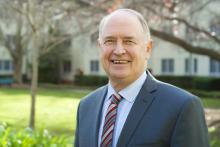Prof Garnaut Lecture Series: The Complex International and Domestic Economics of Climate Change

Professor Ross Garnaut: Climate & Energy Transition in Australia
Prof Ross Garnaut will deliver a six-part seminar series on the challenges and opportunities of energy transition in Australia. The seminars, which will also be available by webinar, will build the case for the energy transition calling on knowledge of climate science and studies of the economic benefits of mitigation.
A sectoral analysis - covering in particular the electricity sector, transport and industry, and agriculture - will draw out the economics of technological innovation, the falling costs of renewable energy, and the capacity for sequestration in the land, with insight into the role of the mineral sector in strengthening Australia's position in a low-carbon economy.
Lecture 2: The Complex International and Domestic Economics of Climate Change
Climate change represents an unusually complex economic policy challenge, as there are a range of distributional effects of the costs of climate change and its mitigation across countries and generations. How do we value the living standards of people living now against those living in future? How do we value the costs of climate change and its mitigation in rich countries against those in poor countries? Further, a range of policy instruments can be applied to mitigation, and numerous factors inform under which circumstances carbon pricing and regulatory measures are more effective.
This lecture begins with a discussion on measuring the costs and benefits of action to reduce damage from climate change and acknowledges some of the questions raised concerning the economic value of mitigation, in particular, what level of temperature rise compared with pre-industrial levels is economically justified. The discussion considers the case for international trade in emissions entitlements and examines the economics of technological innovation and its relevance to the transition to a low carbon economy. It also discusses the role of public institutions such as ARENA and the Clean Energy Finance Corporation. Finally, the lecture discusses how the historic twenty first century fall in the cost of capital favours renewable energy sources over fossil fuels, which in turn supports the transformation of land use and more generally favours action to secure the interests of future generations.
Thank you to event hosts the University of Melbourne, in particular, the Department of Economics in the Faculty of Business and Economics, the Melbourne Energy Institute, the Energy Transition Hub, and the Melbourne Sustainable Society Institute.


